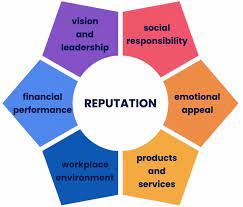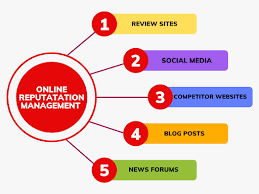In today’s digital age, it’s essential to manage your online reputation and protect yourself from potential harm. With an ever-increasing focus on the power of social media and the impact of a negative online presence, understanding how to protect your reputation is now more important than ever. Knowing how to navigate the complexities of reputation protection will help you in ensuring that your name remains untarnished. In this article, we’ll discuss what exactly reputation protection is and break down some tips for business owners about how to protect their online presence.
Table of Contents
ToggleDefinition of Reputation Protection
Reputation protection is the practice of managing your online presence in order to protect yourself from potential damage to your reputation. This can include everything from monitoring and responding to online reviews, creating a positive online presence, and taking steps to mitigate any negative comments or reviews. With reputation protection, you can ensure that your name remains untarnished and that any potential damage is minimized. It’s important to note that reputation protection isn’t just about responding to negative information; it also involves actively crafting a positive presence for yourself by creating content, engaging with customers on social media, and maintaining relationships with other companies or individuals. Ultimately, reputation protection is all about protecting your name and ensuring that you remain in good standing with everyone who interacts with you online.
Benefits of Reputation Protection
Reputation protection can be a great tool for individuals or businesses looking to maintain a good name and protect themselves from potential damage. The benefits of reputation protection are numerous. Firstly, by monitoring and responding to online reviews, you can ensure that your name remains untarnished by any negative feedback or criticism. Additionally, creating a positive online presence with content and engaging with customers on social media can help build trust in your brand.
What is Online Reputation?
Online reputation is the perception of a person or business online, based on their online content and interactions. It is an important factor for businesses and individuals alike, as it can influence the success or failure of their endeavors. Companies can be judged by customers based on their online reviews, while individuals may be judged by potential employers based on their social media activity. Online reputation management involves monitoring and managing one’s presence online to ensure that it remains positive.
Instead you need the msedge.admx templates from Microsoft ( https://www.microsoft.com/en-us/edge/business/download ) – I used version 87 Stable, and this did the job (choose Get Policy Files once the version is selected).
External Link: https://www.microsoft.com/en-us/edge/business/download
Understanding the Basics
Understanding the basics of online reputation management is essential for anyone looking to protect and enhance their online presence. It involves monitoring your online activity, responding to reviews, creating high-quality content, engaging with influencers, and correcting any misinformation or negative feedback. Monitoring your online activity can help you identify potential issues before they become serious problems. Responding to reviews in a timely manner can ensure that customers feel valued while creating high-quality content will help build credibility and trust.
Impact of a Negative Online Presence
The impact of a negative online presence can be significant and far-reaching. It can affect your relationships, professional opportunities, and even your mental health. Potential employers may research candidates online before making a decision, meaning a bad review or negative comment on social media could cost you the job. It could also adversely affect current relationships; friends, family members, and colleagues may think twice about engaging with someone who has a bad reputation online.
Repercussions of Poor Reputation Management
Poor reputation management can have far-reaching repercussions that can be difficult to undo. When a company or individual fails to take steps to protect their online presence, the consequences can range from lost customers and missed business opportunities to damaged relationships and reputational damage. For example, bad reviews or negative comments on social media can lead potential employers to view you in a less favorable light. Similarly, family and friends may be less likely to engage with someone who has a poor online presence.
Copyright: © 2019 Giardini et al. This is an open access article distributed under the terms of the Creative Commons Attribution License, which permits unrestricted use, distribution, and reproduction in any medium, provided the original author and source are credited.
External Link: http://creativecommons.org/licenses/by/4.0/
Real Time Monitoring & Crisis Communication Plan
Real time monitoring and crisis communication plans are essential for protecting an organization’s reputation. By keeping a close eye on the online conversation, businesses can detect any potential issues before they become serious. This allows them to address the issue quickly and effectively, reducing the risk of reputational damage. Additionally, having a crisis communication plan in place ensures that the business is prepared for any potential situations that may arise.
How To Protect Your Online Reputation?
Creating and maintaining a positive online reputation is essential for any business. Fortunately, there are various steps you can take to protect your reputation from harm. First, be sure to monitor your online presence regularly. This means keeping track of any reviews or comments that appear on social media and other websites. Also, respond promptly to any negative reviews or comments in order to maintain customer trust and loyalty. Additionally, create high-quality content such as blog posts, videos, and articles that will help boost your visibility and promote a positive image of your business.
The simple fact of the matter is that you can be a polite, decent person online and still be subject to an attack on your reputation online. A disgruntled ex-employee, an angry ex-lover, a total stranger… it doesn’t really matter what the source is. Just ask Al Nino , a man whose name sounds similar to the weather phenomenon El Niño. He spent a summer tormented by angry letters and phone calls over the weather.
External Link: http://www.worldclimatereport.com/archive/previous_issues/vol3/v3n19/cutting.htm
Assessing Your Digital Footprint & Keyword Landscape
Assessing your digital footprint and keyword landscape is an important step in protecting your online reputation. By taking the time to monitor relevant keywords associated with your brand, you can quickly identify any potential issues that could damage your reputation. Additionally, regularly monitoring your digital footprint will help you spot any changes or trends in how customers are interacting with and perceiving your business. This way, you can take steps to address any negative comments or reviews before they have a chance to spread.
Investing in Professional Reputation Management Services
Investing in professional reputation management services is an invaluable way to protect your online presence. A reputable firm can help you take proactive steps to ensure that inaccurate or outdated information about your business does not surface. Additionally, the firm can monitor for any new content about your company, which gives you the opportunity to address any issues before they have a chance to cause damage.
Enhancing Your Content Creation Strategy
Enhancing your content creation strategy is an important way to protect your online reputation. Quality content that is relevant to your business and customers can help build trust among potential customers, as well as establish you as an expert in your field. Furthermore, creating compelling content that encourages engagement from users can be beneficial in terms of increasing brand awareness and recognition. Additionally, using search engine optimization techniques when creating content can help it gain visibility on search engine results pages and potentially lead to more website traffic and conversions.
Leveraging Social Media Platforms to Your Advantage
Leveraging social media platforms to your advantage can be a powerful tool in protecting and enhancing your online reputation. By creating social media profiles and regularly posting relevant content, you can increase brand recognition and visibility while engaging with potential customers in a meaningful way. Additionally, using the various tools available through social media platforms such as hashtags, contests, polls, etc. can help draw attention to posts which will lead to increased engagement from users. Furthermore, responding to user comments and queries quickly and professionally helps create an atmosphere of trust between businesses and their customers.
Tips For Business Owners to Protect Their Online Presence
Business owners should take steps to protect their online presence in order to maintain a good reputation and trust with customers. A few tips to consider include: monitoring all content posted on their website or social media, ensuring that any user-generated content is appropriate and compliant with industry regulations, creating a privacy policy to inform users of how data will be used and stored, responding promptly to customer queries or complaints, and avoiding controversial topics when engaging with customers.
Potential Strategies to Repair a Damaged Online Reputation
Repairing a damaged online reputation can be challenging, but fortunately there are strategies that can help. One of the most important steps is responding promptly and appropriately to negative reviews or comments. This will show customers that you care about their feedback and are willing to work with them to resolve any issues. Additionally, it’s important to analyze the entire search landscape in order to identify any damaging content that may be appearing on multiple websites. Creating positive reviews and content can also help balance out any negative information that may be visible. Setting up an effective crisis management plan is also essential for addressing potential issues before they become public knowledge.
Conclusion
Ultimately, repairing a damaged online reputation is no easy feat. However, by utilizing the strategies mentioned above and implementing a comprehensive protection system, businesses can ensure they are well-equipped to handle any crisis situation and restore their good name. It’s important to remember that being proactive is key; responding promptly and appropriately to negative reviews or comments, setting up an effective crisis management plan, and creating positive reviews and content can all help maintain a positive online presence.



